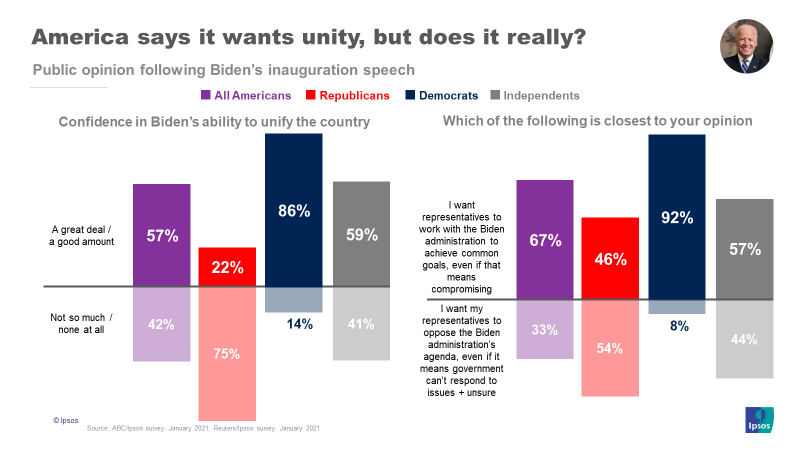The Inside Track: January Highlights
The Inside Track
The Inside Track 2021: America the Uncertain webinar series will present in-depth analysis of the latest public opinion data on current trends and recent events influencing the political landscape. Read on below for highlights and key insights from this month’s webinar.
What you need to know
Most people are encountering the virus. Now, three in four Americans know someone who has tested positive for COVID-19.
- At the same time, more people are willing and interested in taking the COVID-19 vaccine.
A sizeable number of people across the country live in a fact-free reality shaped by media echo chambers, leading to violent events like the attack on the Capitol. For example, more than half of Republicans cannot correctly identify a known QAnon conspiracy as false.
- These radically different views on politics extend to election legitimacy and set the stage for the Capitol riots. In the aftermath, these partisan worlds also shape how people make sense of what happened at the Capitol.
With a third of self-identified Republicans identifying as ‘Trump supporters’ over ‘traditional Republican’, what the GOP does next is up in the air. Nearly all Trump supporters (92%) believe he should be the 2024 Republican nominee, while only 42% of people who identify as traditional Republicans agree.
- While Trump supporters and traditional Republicans disagree on where the party should go from here, both groups are much more likely to hold similar views around the attack on the Capitol.
Biden starts his presidency with positive job approval and a mandate to control the pandemic and unify the country. While most Democrats believe Biden can bring the country together, Republicans have little to no confidence that the president can do this.
- President Biden has a steep hill ahead of him. Most Republicans are in no mood to compromise making national unity a doubtful prospect.
Deep Dive
America since the election
COVID-19 is touching all Americans. Three in four people now know someone who tested positive for COVID-19, up significantly from the spring. Still, by and large, most Americans have not gotten the novel coronavirus, leaving lots of potential for possible spread and infection.
At the same time, Americans' interest and willingness to take a vaccine continues to grow. Seventy percent of people said they would be willing to get one of the approved COVID-19 vaccines as it becomes available to them, an 11-point increase from the fall, according to the Axios/Ipsos Coronavirus Index.

Since the election, the country saw just how dangerous and pervasive conspiratorial thinking can get. A sizeable minority of Republicans do not believe that President Biden is the rightful winner, and conspiracy theories around the 2020 election and politics are holding sway over Republicans. More than half of Republicans cannot identify a known QAnon conspiracy as false. Beyond the QAnon conspiracy, many Republicans can’t identify basic election conspiracies as false.

The Capitol Riot
Between the pandemic, an unusual election, and the fact that partisanship determines the realities people live in, the stage was set for the violence that took place at the Capitol riots long before January 6th.
All of these events– the pandemic, an unusual election, and the pervasiveness of partisan conspiracy theories– set the stage for the violence that took place at the Capitol. And, while majorities across the two major parties in American politics don’t see eye to eye on whether Satan-worshipping elites run politics and media, most people from both parties oppose the protesters who broke into the Capitol. Despite this point of agreement, how people interpret the meaning behind the mob at the Capitol divides Americans back into partisan factions. Most Democrats (80%) see the attack as an attempted coup, while only about one in five Republicans agree (22%), Axios/Ipsos polling finds.

Schism in the GOP?
Where is the Republican party after the close of the Trump presidency and the attack on the Capitol? The GOP is split by traditionalists and those who support former President Trump. These two camps break down into 56% of people who self-identify as ‘traditional Republicans’ and 36% who are Trump Republicans, Axios/Ipsos polling finds.
What divides these two groups of Republicans is where Donald Trump fits into the GOP’s future. Only half of traditional Republicans believe that the Republican party is better with Trump in it. On the other hand, nearly all Trump Republicans (92%) agree that their party is better when Trump is part of it. A similar fissure forms when Republicans look ahead to who the nominee should be for president in 2024.

Start of the Biden Presidency
President Biden kicked off his presidency with above-water approval numbers and a mandate to get the pandemic under control and unite a fractured country. Whether people believe Biden can bring the country together is up for debate. Unsurprisingly, whether you believe in his ability to accomplish this rests on what party a person identifies with; Democrats believe Biden can, while Republicans have little to no confidence in Biden.
And, even while people say they want unity, what do they mean by that? Most Democrats want their representatives to work with the Biden administration to achieve common goals, even if that means compromising. This question splits Republicans and independents, with a little under half of Republicans wanting their representatives to compromise.



